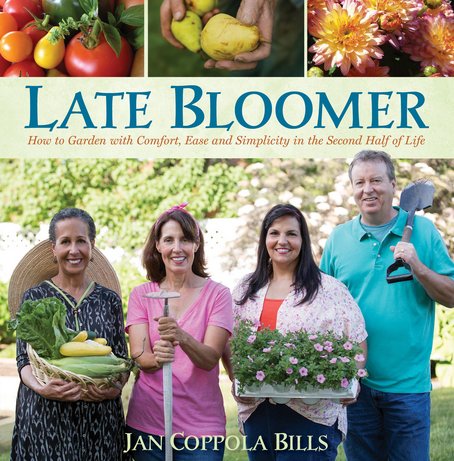Giving Up Gardening A Bad Idea?
By George Graine, Fairfax Master Gardener
Every garden is a chore sometimes, but no real garden is nothing but a chore.
–Nancy Grasby
Late Bloomer (not to be confused with Victoria’s Secret) is a thoughtful gardening book by Jan Coppola Bills aptly subtitled How to Garden With Comfort, Ease and Simplicity in the Second Half of Life (St. Lynn’s Press, 2016). To be clear, this book is not a conventional how-to-garden text, but is filled with simple strategies for achieving easy care and friendly gardens. One might consider this book as a meaningful variant of Chicken Soup for the Gardener’s Soul (2000). That book was dedicated with love to everyone who helps make the world a better place through gardening.
 The question to ask yourself should be “Is a garden something you love or just a labor of love?” You do not have to be in the second half of life to appreciate Late Bloomer. This book shows you how to approach gardening as we age and provides helpful hints and reminders on whatever needs doing.
The question to ask yourself should be “Is a garden something you love or just a labor of love?” You do not have to be in the second half of life to appreciate Late Bloomer. This book shows you how to approach gardening as we age and provides helpful hints and reminders on whatever needs doing.
This book is also helpful for experienced gardeners. It is a treasure trove of gardening information packed into its 140 pages of 13 orderly chapters with many helpful color photos as examples to further explain the text. As stated by the author, this book is “a soulful, satisfying experience, yours to create in a way that connects you with Mother Nature in all her amazing guises.”
The ideal starting point for Late Bloomer is the last chapter called “Perfectly Imperfect-Relaxing and Letting Go.” This chapter is a reminder for setting your own boundaries. Another way to consider this is to recognize that “Gardens are meant to be a safe haven, not a place of bondage. Discussing ways to do things differently in life is a sign of strength.” Amen to that! The key to understanding this book is to help you to change your mind-set by showing how you can lessen workload without having to compromise experiences and passion. The book shows how you can lessen your workload without compromising your gardening experiences and passion.
Do not chase perfection, the book cautions, as this is bound to be unrealistic and almost guarantees a real “hortache.” Surely you probably heard gardeners exclaim that “my garden is a work in progress.”
A maintenance-free garden or landscape is a myth, but with proper planning, problems can be reduced. The author’s gardening credo offers some principles worth adopting:
- I will plant only what I can comfortably tend.
- I will not give myself tasks beyond my ability to easily achieve.
- I will ask for help if necessary.
- I will not concern myself with “perfection.”
- I will allow my garden to deepen my connection with nature.
- I will garden simply because it pleases my soul.
Take some time to read this credo again. Is there a good reason why these simple statements need to be limited? Maybe you would like to add a few more to make it more personal. It is unadulterated balderdash to think that these statements only apply to the 40+ gardener. In a word, this credo can be summed up as simplicity; i.e., making gardening simple so that you can continue to enjoy it more. In addition to simplicity, stir the pot for beauty and harmony, comfort and ease, celebrating life with food from your soil and relaxation and letting go.
Many of us understand that gardeners often cope with some degree of trial and error. Discovering the truths and the myths can sometimes be frustrating but at the same time an eye opener. Perhaps a universal garden credo is to forget perfection and just enjoy yourself and do your own thing.
Sustainability and success are keys to planning and tending the garden. This is just another way of expressing the gardener’s mantra of right plant, right place. Of course, it helps if you read the plant label, maybe check the internet, and even ask questions of knowledgeable folks. Research has changed the way we garden, but Mother Nature can still be very forgiving of our mistakes. Knowledge pays a big dividend when we find out what we do not know.
Stay connected to practicality and purpose and then you should be happy because you will reap what you sow. Ideally it is wise to have an idea of what you desire to accomplish in your landscape before setting out to the garden center otherwise you can become overwhelmed and even confused.
The author’s writing makes gardening sound so simple and it really is when you give it some thought. She does not use hortie jargon and is so down to earth (pun on purpose). As an example, the complications associated with plant hardiness zones and something esoteric like microclimate are written in an easy-to-understand manner. One wonders why other writers do not make the difficult easy to understand.
In summary, know that there is more to a garden than just plants. Make your garden unique and with its own personality. Think discovery! Curiosity may have killed the cat but garden curiosity is a practical and beneficial way to stay healthy both physically and mentally. Use materials in a different way such as repurposing objects that you may find in an antique shop. Could your Aunt Maude’s crock that has been stored in the attic make a wonderful container? Trust that Jan Coppola Bills has the right ticket to help you rethink gardening. Remember, age is just a number and not an excuse.